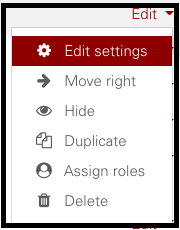Getting Ready for the Spring Semester 4-3-2-1!

Dates, dates, dates! Not the sweet, chewy kind or the fun getting-to-know-you kind but the planning for a new semester kind. Yes, it’s that time of year! One of the consistent recommendations in getting ready for the next semester is to think about dates. So let’s explore some date-related and other “to-do” items you can check off now, do the week before classes, and complete during the first two weeks of classes to start the semester ahead of the game.
These recommendations all involve using the NC State University learning management system, Moodle, and assume some prior usage of Moodle as an instructor.
If you are new to Moodle or would like step-by-step guidance in setting it up, join us for a face-2-face (in-person or online options) training session in January (register here) or sign up for the self-paced Getting Started with Moodle online course. You can also use the Step-by-Step Online Course Creation Guide if you want directions without taking a course/workshop.
December To-Dos: The Top Four!
Hold on to that last bit of energy you have before the semester break or use that boost from turning your grades in, and get some of this work done to help your spring semester flow.
- Course Copier Considerations → As you create your spring semester courses in Moodle, reflect on how Moodle is set up in the semester you plan to copy. It may be that you would like to pick a different semester than the one you taught most recently. For example, if you taught this course last spring online but are now teaching it in-person, you may want to look at copying the course from Spring 2019 instead of from Spring 2020. Perhaps you’ve thought that you would like a more organized course. If so, consider choosing the “Quick Start Course Shell,” which is essentially a template with organized modules. Then you can populate content into the quick start course shell that you copied from a previous semester by using the “Backup and Restore” feature in Moodle.
- For more help with reflection and thinking about organizing your course for student success, take the online self-paced short course WolfSNAPS: Setting up for Success (30 to 90 minutes).
- Date Review and New Dates → Carefully review and update dates for the new semester, especially due dates in the syllabus, Moodle Assignment dates, Moodle Discussion Boards/Forum dates, and so on. Did you know that you can get some automated help from Moodle in updating dates from semester to semester? Use the “Dates Report” to change multiple dates at the same time.Did you know that you can get some automated help from Moodle in updating dates from semester to semester? Use the “Dates Report” to change multiple dates at the same time. Consider adding dates to elements in Moodle that didn’t previously include dates. When you add dates to activities and resources/content, students can use the Calendar and the Upcoming Events blocks to help them stay organized and successful.
 Hiding and Unhiding → After you’ve copied a course or imported content, skim to check what is hidden and available for students to view. Hide entire topics/modules or individual activities/resources.
Hiding and Unhiding → After you’ve copied a course or imported content, skim to check what is hidden and available for students to view. Hide entire topics/modules or individual activities/resources.
- Considerations: Do you want students to see a “Getting Started” module before class even starts but not see other segments of your course? Perhaps you want them to have the choice to “get ahead” on some readings, so you want to make those available right from the start? What other considerations might you make to help students get organized and work at their own pace through some of your content?
- Permissions and Linking → Certain activities and resources must be “reactivated” or relinked to work in a new semester. Here are some things to check!
- Panopto Videos – if you have videos recorded in Panopto and then added into your course, check the access permissions. See more on how the course copier works with Panopto in this article.
- PlayPosit Bulbs – if you have created interactive videos with PlayPosit, they should work in a course copied from a previous semester. However, the links sometimes do not stay active when using a backup and restore. Check to see if PlayPosit has a preview link for you as the instructor, and you can still see the bulb. If not, use the “Set Bulb Link” to re-select the bulb for the new course.
- Google Assignments – if you created any Google Assignments, they will not copy over to the new semester, so you must re-create them. If you used a rubric, you will be able to choose it again rather than re-creating it.
- Other Instructors/TAs – if you are co-teaching, working with a graduate student, etc., be sure that you’ve added them to the course with the appropriate role.
- Test Article Links and Other URLs – Click on links in your course to see how they open and make sure none have been made unavailable between semesters.
January Prior-to-Day-One To-Dos: The Top Three!
Hopefully, you are refreshed and ready to jump into prepping your students to be successful in your course(s). If you haven’t set up Moodle or looked over the functionality of your course, i.e., updated dates, permissions, links, and so on, get that done first (see the December to-do ideas).
- Welcome Letter and Video → Create a welcome letter and a video “Hello” to students with information about you and specific details about how they can succeed in the class. Add this personal touch to build community and help develop expectations. Here’s a welcome letter template to get you started — make a copy to use it yourself! To create a video, you can use Panopto Create from your browser or make a Zoom recording. You can also consider opening your course early so students can review the welcome and feel ready for the first day!
- Revisiting/Creating Learning Objectives → Help provide goals for your students and define the purpose of your course. If you already have objectives, this is an excellent time to review them and the assessments (quizzes, projects, assignments, etc.) to see if they all connect. Are your goals/objectives for students evaluated when they take tests, write papers, do assignments, etc., or are those activities/tests really assessing other goals? Learn more about creating/reviewing learning objectives.
- Think about Trying Something New → Although this year continues to be overwhelming to many; you may be the kind of instructor who would benefit from trying something new to refresh your teaching spirit! Check out DELTAs workshop offerings that include tools to make videos interactive, methods to create brief interactive activities embedded into Moodle, new features for teaching with Google Tools, and more!
First Three Weeks of the New Semester To-Dos: The Top Two!
Use the first few weeks of class to establish practices that will help your students be successful and (hopefully) make your life a little smoother as the semester progresses.
- Prioritize Communication → Communicate with students deliberately and often at the beginning of the semester. Plan announcements, try opening up a Zoom session to communicate, consider using Google Chat with your class, Also provide an opportunity for student-to-student interactions. Check out these suggestions!
- Give Early Feedback → Give feedback on an early “low stakes” assignment, so students understand your expectations. You can automate some of this feedback by using tools like Moodle Quizzes and Playposit interactive videos. Students will get immediate feedback which helps connect them to the class.
The Rest of the Semester: The Final One!
Use the plus-one approach to this semester. If you are interested in course improvement, can you think about just one more way you can interact with students or one more way you can build classroom community? Maybe there’s just one new way to provide content to students — keep being overwhelmed at bay but continue working on your course with a plus-one approach.
Check the DELTA Teaching Resources site for updated ideas, recordings, workshops, and more on topics from course design to assessment to technology tools. Join a workshop, or let us provide a custom workshop designed with you for your department, program, or group in an area of your personalized needs! Let DELTA and LearnTech help with your planning and instructional needs.


